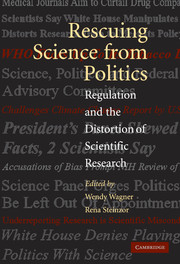Book contents
- Frontmatter
- Contents
- About the Contributors
- Acknowledgments
- Prologue
- Introduction: Principled Science
- PART I FREEDOM AND INDEPENDENCE
- PART II TRANSPARENCY AND HONESTY
- 5 The Data Wars, Adaptive Management, and the Irony of “Sound Science”
- 6 The Dual Legacy of Daubert v. Merrell-Dow Pharmaceutical: Trading Junk Science for Insidious Science
- 7 Using Science in a Political World: The Importance of Transparency in Natural Resource Regulation
- 8 Transforming Science into Law: Default Reasoning in International Trade Disputes
- 9 Two Models for Scientific Transparency in Environmental Law
- PART III A PUBLIC INFRASTRUCTURE FOR SCIENCE
- PART IV RECOMMENDATIONS AND CONCLUSION
- Index
5 - The Data Wars, Adaptive Management, and the Irony of “Sound Science”
Published online by Cambridge University Press: 04 August 2010
- Frontmatter
- Contents
- About the Contributors
- Acknowledgments
- Prologue
- Introduction: Principled Science
- PART I FREEDOM AND INDEPENDENCE
- PART II TRANSPARENCY AND HONESTY
- 5 The Data Wars, Adaptive Management, and the Irony of “Sound Science”
- 6 The Dual Legacy of Daubert v. Merrell-Dow Pharmaceutical: Trading Junk Science for Insidious Science
- 7 Using Science in a Political World: The Importance of Transparency in Natural Resource Regulation
- 8 Transforming Science into Law: Default Reasoning in International Trade Disputes
- 9 Two Models for Scientific Transparency in Environmental Law
- PART III A PUBLIC INFRASTRUCTURE FOR SCIENCE
- PART IV RECOMMENDATIONS AND CONCLUSION
- Index
Summary
The Sound-Science Crusade versus Adaptive Management
What science has to tell policy makers has always been contested terrain. Rachel Carson, in the New Yorker essays from which her classic book Silent Spring was drawn, questioned the government's manipulation of science to support the toxicological safety of pesticides. Carson included a charge that a panel of toxicologists at the National Academies of Science (NAS) had been stacked by industry-sponsored experts. Later, when the publication of Silent Spring itself ignited a public controversy over the integrity of science, President John F. Kennedy was forced to bypass the NAS to receive advice from the President's Science Advisory Committee (PSAC), which issued a report in 1963 largely supporting Carson. There followed counterattacks on the findings of the PSAC by the NAS, counter-counterattacks against the scientific integrity of the NAS by analysts at the Audubon Society, a proliferation of studies by other researchers, and over a dozen separate congressional pesticide-related hearings by the Eighty-Eighth Congress between 1963 and 1964.
In the ensuing forty years, there have been so many other episodes in which science is said to have been misused by policy makers that it is possible today for commentators to identify different patterns of distortion and to argue over which pattern best captures the current state of science–policy interaction. This argument matters because, depending on which pattern is perceived to describe reality, entirely different narratives about regulatory science can emerge.
- Type
- Chapter
- Information
- Rescuing Science from PoliticsRegulation and the Distortion of Scientific Research, pp. 103 - 119Publisher: Cambridge University PressPrint publication year: 2006



